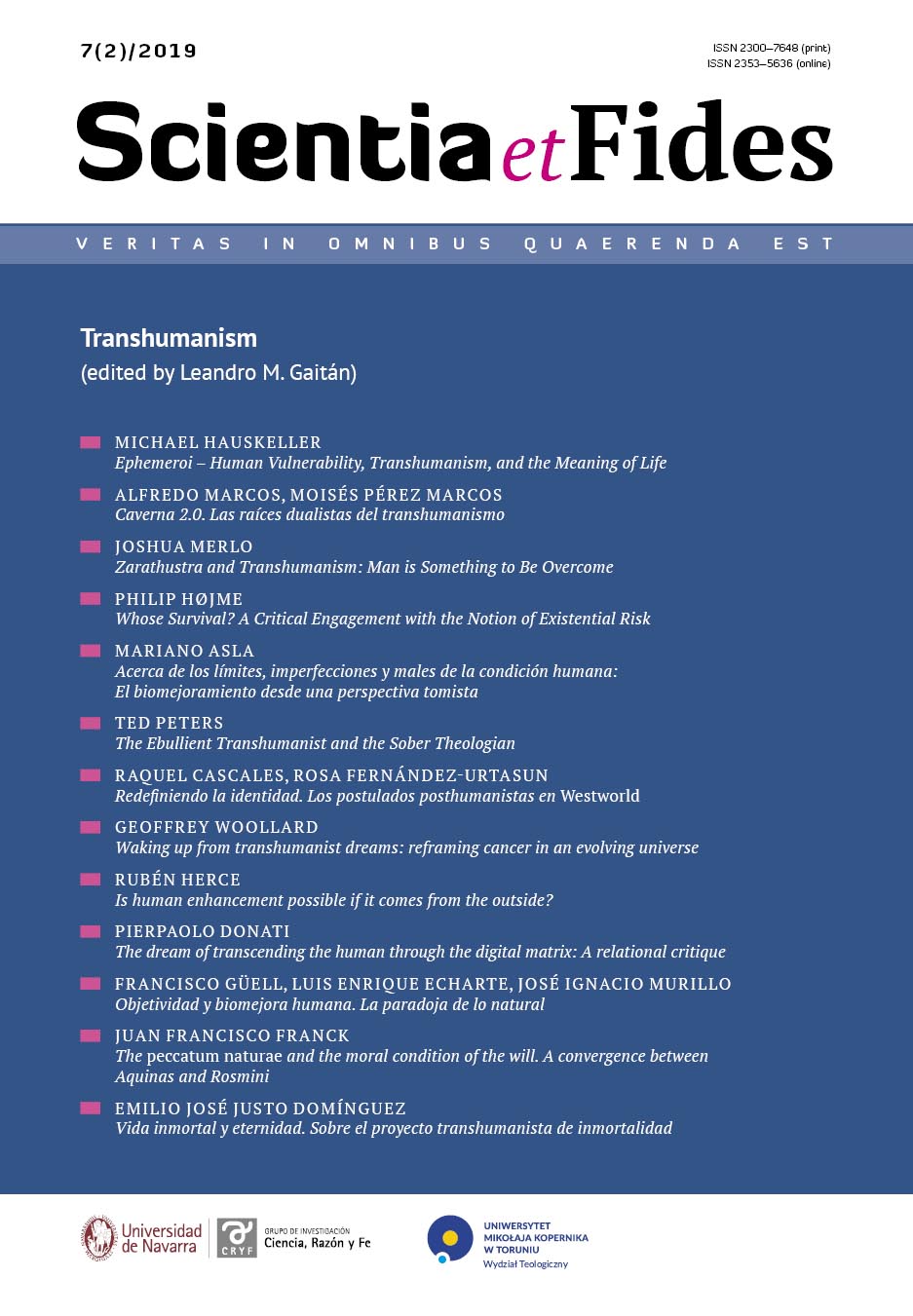Whose Survival? A Critical Engagement with the Notion of Existential Risk
Słowa kluczowe
critical theory, enlightenment, future, humanity, transhumanism, utopia.Abstrakt
This paper provides a critique of Bostrom’s concern with existential risks, a critique which relies on Adorno and Horkheimer’s interpretation of the Enlightenment. Their interpretation is used to elicit the inner contradictions of transhumanist thought and to show the invalid premises on which it is based. By first outlining Bostrom’s position this paper argues that transhumanism reverts to myth in its attempt to surpass the human condition. Bostrom’s argument is based on three pillars, Maxipok, Parfitian population ethics and a universal notion of general human values. By attempting to transcend the human condition, to achieve post-humanity, transhumanism reverts to myth. Thus, the aim of this paper is to provide a critical examination of transhumanism which elicits its tacit contradictions. It will also be argued that transhumanism’s focus on a universal, all-encompassing, notion of humanity (Earth-originating intelligent life) neglects any concern with actual lived lives. This absence is problematic because it clearly shows that there is a discrepancy, between transhumanism’s claimed concern for all of humanity and the practical implications of proposing a universal notion of humanity. This paper will conclude, that transhumanism’s lack of concern with actual lives is due to its universal and totalising gestures. Gestures which allow for universal claims such as general values or Earth-originating intelligent life.Bibliografia
Adams, Douglas. 2003[1985]. “The Hitchhiker's Guide to the Galaxy: The Original Radio Scripts”. ed. Geoffery Perkins. London: Pan Books.
Adorno, W, Theodor. 1990[1966]. ”Negative Dialectics”. trans. E.B. Ashton. London: Routledge.
Adorno, W, Theodor & Max Horkheimer. 2002[1944]. “Dialectic of Enlightenment”. Ed. G. S. Noerr. trans. E. Jephott. Stanford: Stanford University Press.
Bostrom, Nick. 2014a. “Superintelligence.” Oxford: Oxford University Press.
Bostrom, Nick. 2014b. ”Hail Mary, Value Porosity, and Utility Diversification”. Accessed March 14, 2019. https://nickbostrom.com/papers/porosity.pdf
Bostrom, Nick. 2013. "Existential Risk Prevention as Global Priority." Global Policy, 4(1):15-31.
Bostrom, Nick. 2009. "The Future of Humanity." In New Waves in Philosophy of Technology, ed. Jan-Kyrre Berg Olsen, Evan Selinger, & Søren Riis. 186-215. New York: Palgrave McMillan.
Bostrom, Nick. 2005a. “A History of Transhumanist Thought”. Journal of Evolution and Technology. 14(1):1-25. Accessed March 11, 2019.
https://www.jetpress.org/volume14/bostrom.html
Bostrom, Nick. 2005b. “Transhumanist Values”. In Ethical Issues for the Twenty-first Century, ed. Frederick Adams. 3-14. Charlottesville: Philosophy Documentation Center.
Bostrom, Nick. 2002. “Existential Risks: Analyzing Human Extinction Scenarios and Related Hazards”. Journal of Evolution and Technology, 9(1). Accessed March 11, 2019. https://www.jetpress.org/volume9/risks.html
Braidotti, Rosi. 2013. “The Posthuman”. Cambridge: Polity Press.
Butler, Judith. 2012. “Can one lead a good life in a bad life? - Adorno Prize Lecture”. Radical Philosophy. Accessed March 5, 2019. https://www.radicalphilosophyarchive.com/wp-content/files_mf/rp176_article1_judith_butler_adorno_prize_lecture.pdf
Delicata, Nadia. 2018. “Homo technologicus and the Recovery of a Universal Ethic: Maximus the Confessor and Romano Guardini”. Accessed March 11, 2019. http://dx.doi.org/10.12775/SetF.2018.020
Future of Life Institute. “Research Priorities for Robust and Beneficial Artificial Intelligence”. Accessed March 5, 2019. https://futureoflife.org/ai-open-letter/
HumanityPlus. 2009. “Transhumanist Declaration”. Accessed March 5, 2019. https://humanityplus.org/philosophy/transhumanist-declaration/
Højme, Philip. 2019. ”Whose survival? A Critical Engagement with Transhumanism” Presented at Transhumanizm - Idee / Strategie / Wątpliwości 2.0, Warsaw, Poland, January, 19-20.
Højme, Philip. 2018. ”Whose survival? An exploration of the nature/culture distinction in transhumanist thought concerned with the future of humanity” Presented at The 10th Beyond Humanism Conference, Wroclaw, Poland, July 18-21.
Joseph Bien-Kahn. 2017. “You'll Die in a Nuclear War, but These Elites Will Be Saved”. Vice, May 3. Accessed March 11, 2019. https://www.vice.com/en_us/article/wnwq4y/youll-die-in-a-nuclear-war-but-these-elites-will-be-saved
Kermisch, Céline. 2011. “Homo Sapiens Technologicus”. Review of Homo Sapiens Technologicus. Techné, 15(3):241-242.
NASA, Centre for Near Earth Object Studies. “Sentry: Earth Impact Monitoring”. Accessed March 5, 2019. https://cneos.jpl.nasa.gov/sentry/intro.html
Parfit, Derek. revised ed. 1984[1984]. “Reasons and Persons”. Oxford: Clarendon Press.
Sharp Entertainment & NGC Studios, 2011-2014, “Doomsdays Preppers”. TV-show aired over 4 seasons in 54 episodes on National Geographic Channel, distributed by 20th Television, US. Accessed March 8, 2019. https://www.imdb.com/title/tt2069270/
Pobrania
Opublikowane
Jak cytować
Numer
Dział
Licencja
CC BY ND 4.0. Posiadaczem prawa autorskiego (Licencjodawcą) jest Autor, który na mocy umowy licencyjnej udziela nieodpłatnie prawa do eksploatacji dzieła na polach wskazanych w umowie.
- Licencjodawca udziela Licencjobiorcy licencji niewyłącznej na korzystanie z Utworu/przedmiotu prawa pokrewnego w następujących polach eksploatacji: a) utrwalanie Utworu/przedmiotu prawa pokrewnego; b) reprodukowanie (zwielokrotnienie) Utworu/przedmiotu prawa pokrewnego drukiem i techniką cyfrową (e-book, audiobook); c) wprowadzania do obrotu egzemplarzy zwielokrotnionego Utworu/przedmiotu prawa pokrewnego; d) wprowadzenie Utworu/przedmiotu prawa pokrewnego do pamięci komputera; e) rozpowszechnianie utworu w wersji elektronicznej w formule open access na licencji Creative Commons (CC BY-ND 3.0) poprzez platformę cyfrową Wydawnictwa Naukowego UMK oraz repozytorium UMK.
- Korzystanie przez Licencjobiorcę z utrwalonego Utworu ww. polach nie jest ograniczone czasowo ilościowo i terytorialnie.
- Licencjodawca udziela Licencjobiorcy licencji do Utworu/przedmiotu prawa pokrewnego nieodpłatnie na czas nieokreślony
PEŁEN TEKST UMOWY LICENCYJNEJ >>
Statystyki
Liczba wyświetleń i pobrań: 1036
Liczba cytowań: 1



